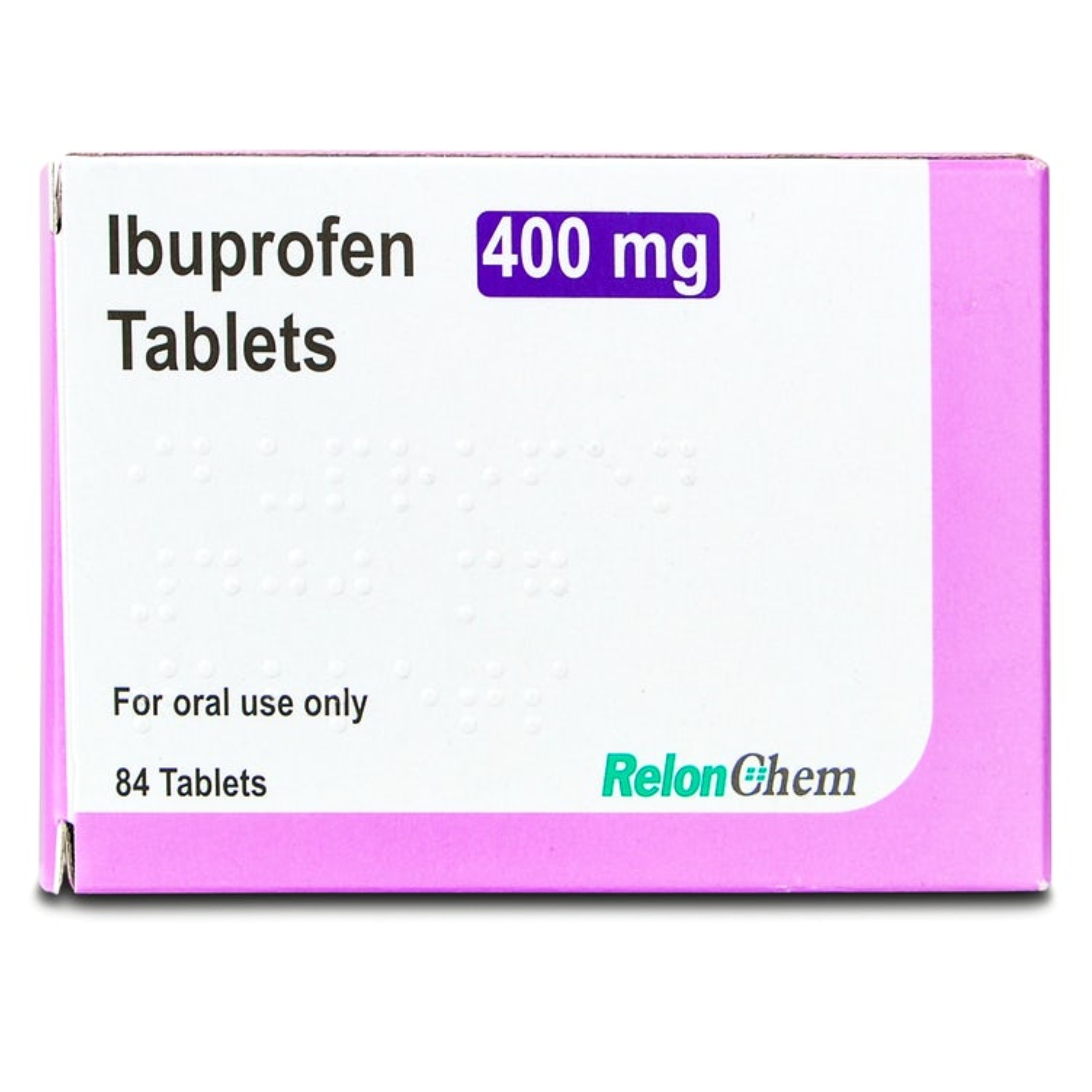Ibuprofen 400mg Tablets
Description
Ibuprofen 400mg Tablets are a non-steroidal anti-inflammatory drug (NSAID) used to relieve pain, reduce inflammation, and lower fever. Ibuprofen is effective in treating various conditions, including menstrual cramps. By inhibiting the production of prostaglandins, which cause inflammation and pain, Ibuprofen provides fast and reliable relief.
- Pain relief: Alleviates mild to moderate pain such as headaches, toothaches, and muscle pain.
- Anti-inflammatory: Reduces inflammation in conditions like arthritis, sprains, and strains.
- Fever reduction: Lowers fever associated with colds, flu, or other infections.
- Fast-acting: Provides relief within 30 minutes of taking the tablet.
Warnings
-
Do not use if you:
- Are allergic to Ibuprofen, other NSAIDs, or any of the ingredients in the tablets.
- Have a history of stomach ulcers, gastrointestinal bleeding, or perforation.
- Have severe heart failure, kidney problems, or liver disease.
- Are in the last trimester of pregnancy.
-
Consult a healthcare provider before use if you:
- Have asthma, as Ibuprofen can trigger asthma attacks in sensitive individuals.
- Have a history of heart disease, high blood pressure, diabetes, or stroke, as long-term use of NSAIDs can increase the risk of cardiovascular problems.
- Are taking other medications, including blood thinners (anticoagulants), corticosteroids, or other NSAIDs.
-
Discontinue use and seek medical advice if:
- You experience symptoms of gastrointestinal bleeding, such as black, tarry stools or vomiting blood.
- You develop a rash, itching, swelling, or difficulty breathing, as this could indicate an allergic reaction.
-
Keep out of reach of children:
Store Ibuprofen tablets safely to prevent accidental ingestion by children.
Directions
-
How to take:
- Take 1 tablet (400mg) orally with a glass of water.
- It is best to take Ibuprofen with food or after a meal to reduce the risk of stomach upset.
-
Dosage:
- Adults and children over 12 years: Take 1 tablet every 4-6 hours as needed for pain or fever.
- Do not take more than 3 tablets (1200mg) in 24 hours unless directed by a doctor.
-
Do not exceed the recommended dose:
Taking more than the recommended dose can increase the risk of side effects, particularly gastrointestinal bleeding or kidney damage. -
Storage:
Store Ibuprofen tablets in a cool, dry place away from direct sunlight. Keep them in their original packaging and out of reach of children.
Ingredients
Active Ingredient:
- Ibuprofen (400mg): A non-steroidal anti-inflammatory drug (NSAID) that provides pain relief, reduces inflammation, and lowers fever.
Other Ingredients:
- Microcrystalline cellulose
- Croscarmellose sodium
- Magnesium stearate
- Hypromellose
- Titanium dioxide
- Polyethylene glycol
These ingredients help form the tablet and ensure the stability and absorption of the active compound.
Side Effects
Common Side Effects:
- Gastrointestinal discomfort: Ibuprofen may cause stomach pain, nausea, or indigestion, especially if taken on an empty stomach.
- Dizziness or headaches: Some users may experience mild dizziness or headaches after taking Ibuprofen.
Less Common Side Effects:
- Heartburn or reflux: Prolonged use of Ibuprofen may cause heartburn or acid reflux in some individuals.
- Increased blood pressure: NSAIDs like Ibuprofen may raise blood pressure in some users.
Rare Side Effects:
- Gastrointestinal bleeding: Prolonged or high-dose use of Ibuprofen can cause stomach ulcers, gastrointestinal bleeding, or perforation. Symptoms include black, tarry stools or vomiting blood.
- Kidney damage: Long-term use of Ibuprofen may lead to kidney problems, particularly in individuals with pre-existing kidney conditions or dehydration.
- Allergic reactions: Rare cases of rash, swelling, or difficulty breathing may occur. Discontinue use and seek immediate medical attention if you experience these symptoms.
FAQs
-
How does Ibuprofen work?
Ibuprofen works by blocking the production of prostaglandins, chemicals that cause inflammation, pain, and fever. By reducing prostaglandins, Ibuprofen helps relieve pain, reduce inflammation, and bring down fevers. -
How long does Ibuprofen take to work?
Ibuprofen typically starts working within 20-30 minutes after taking the tablet, providing relief for 4-6 hours. -
How often can I take Ibuprofen 400mg?
The usual dose for adults and children over 12 years is 1 tablet (400mg) every 4-6 hours as needed. Do not take more than 3 tablets (1200mg) in 24 hours unless directed by a healthcare professional. -
Can I take Ibuprofen on an empty stomach?
Ibuprofen should be taken with food or a glass of milk to minimize the risk of stomach irritation. Taking it on an empty stomach may increase the chance of gastrointestinal discomfort. -
Can I use Ibuprofen for long-term pain management?
Ibuprofen is intended for short-term use. If you need pain relief for longer than 10 days, consult your doctor to discuss alternative treatments or ongoing management options.



